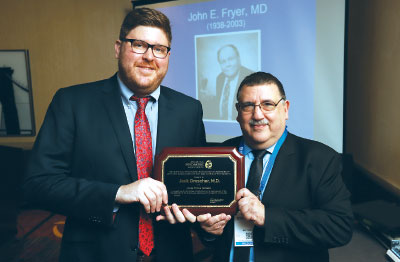Drescher Recounts Long Journey for Gay Equality in Fryer Lecture
Abstract
APA’s decision to remove homosexuality from DSM—catalyzed by the courage of John Fryer, M.D.—removed the medical and scientific justification for discrimination against gay people.
Individuals can make a difference.
That’s at least one of the lessons to be learned from the life of gay rights pioneer John Fryer, M.D., said Jack Drescher, M.D., the recipient of the 2018 John Fryer Award. The award is co-sponsored by APA and the Association of Gay and Lesbian Psychiatrists.

Eric Yarbrough, M.D., vice chair of APA’s Council on Minority Mental Health and Health Disparities and a member of APA’S LGBTQ Caucus (left), presents APA’s 2018 John Fryer Award to Jack Drescher, M.D.
Delivering the John Fryer Award Lecture at APA’s 2018 Annual Meeting last month in New York, Drescher recounted the history of stigma and discrimination related to homosexuality within psychiatry and psychoanalysis and the events leading up to Fryer’s anonymous address in disguise at the 1972 Annual Meeting in Dallas, the subsequent decision by APA to remove homosexuality from DSM, and the march of social changes since then leading to marriage equality.
Drescher is a past chair of APA’s Committee on Gay, Lesbian, and Bisexual Issues and served on the DSM-5 Work Group on Sexual and Gender Identity Disorders. Among other positions, he is also a clinical professor of psychiatry at Columbia University, training and supervising analyst at the William Alanson White Institute, and a member of the World Health Organization’s Working Group on the Classification of Sexual Disorders and Sexual Health revising ICD-11.
(A play about the life of John Fryer, “The 217 Boxes of Dr. Henry Anonymous,” was performed at the Jerome Robbins Theater in the Baryshnikov Center for the Arts in conjunction with APA’s Annual Meeting. The play was followed by a discussion that included APA CEO and Medical Director Saul Levin, M.D., M.P.A.)
Drescher emphasized that the decision to remove homosexuality from the diagnostic manual—catalyzed by Fryer—was seminal and made much of the more recent progress possible. “Religious, governmental, military, and educational institutions were deprived of medical or scientific rationalization for discrimination,” Drescher said.
The decision changed the conversation about gay people, Drescher said: if homosexuality was not an illness and if openly gay people could function as productive citizens, the question in the aftermath of the DSM decision became, What moral and legal principles should be endorsed to allow gay people to freely and openly live their lives?
From this flowed many of the advances in the workplace (gay people became more visible as members of the military, teachers, physicians, and more), in the family sphere (marriage, adoption, inheritance rights, hospital visitation rights), and in the religious arena (acceptance of congregants, ordination of ministry), as well as the emergence of transgender rights. “The social acceptance of openly gay men and women gradually reached unprecedented levels,” Drescher said.
However, the 1973 decision was preceded by a long history of contention and debate about homosexuality and mental illness that encompassed three broad viewpoints about homosexuality: a normal variant of sexual expression, a pathological trait, or a form of “immaturity.”
The last viewpoint was the prevailing one within psychoanalysis, beginning with Freud, who—though he did not believe homosexuality to be pathological—nevertheless regarded it as an expression of a failure to mature sexually. In a famous letter to a mother, Freud wrote, “Homosexuality is assuredly no advantage, but it is nothing to be ashamed of, no vice, no degradation; it cannot be classified as an illness; we consider it to be a variation of the sexual function, produced by a certain arrest of sexual development.”
Other analysts took a more virulently discriminatory view of homosexuality. In the latter part of the 20th century, however, a number of psychiatrists—Judd Marmor, M.D., Robert Spitzer, M.D., and Robert Stoller, M.D., among them—began to question the traditional psychoanalytic view.
At the 1973 Annual Meeting in Dallas, Fryer appeared in disguise along with gay activists Frank Kameny and Barbara Gittings. Drescher quoted from Fryer’s address during that Annual Meeting 46 years ago: “As psychiatrists who are homosexual, we must know our place and what we must do to be successful. If our goal is academic appointment, a level of earning capacity equal to our fellows, or admission to a psychoanalytic institute, we must make certain that no one in a position of power is aware of our sexual orientation or gender identity. Much like the black man with the light skin who chooses to live as a white man, we cannot be seen with our real friends—our real homosexual family—lest our secret be known and our dooms sealed. …”
Drescher noted that despite advances in the years since then, there has been a retrenchment in the rights of the LGBTQI community in the form of freedom of religion laws and the ban against transgender people in the military. Drawing on the iconic quote from Dr. Martin Luther King about the arc of history, Drescher said it may not always be a perfectly linear progression—but it does in the end, as King said, “bend toward justice.” ■
See related article: “Fryer’s ‘Extraordinary’ Action Led to Opening of Doors for Gay Individuals”.



